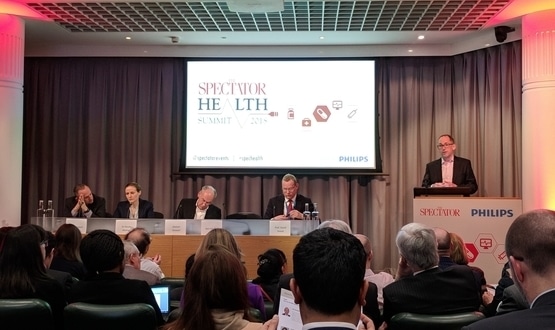UK can be ‘world leader in AI’ if NHS data can be tapped
- 3 April 2018

The parliamentary under secretary for the Department of Health and Social Care has said the UK could be a world leader in AI research and “unlock a wake of innovation throughout the NHS” by harnessing patient data sets.
Speaking at the Spectator Health Summit on Monday 26 March, Lord James O’Shaughnessy suggested that citizen data held by the NHS was “an asset that no other country can bring together”, further claiming that it was the key to transforming Britain’s healthcare industry and making it “the global centre for life sciences trials, genomics and personalised medicine”.
However, O’Shaughnessy said the public first needed to be convinced about the benefits of data collection and assured that their information would be used safely and responsibly.
“The penny has dropped and dropped very hard about the potential that can come from mobilising the NHS data set that we have,” he said.
“While we want to unlock the potential [of data], we have to reassure the public that we will use their data safely, legally and securely.”
Referencing concerns exacerbated by the failed care.data programme and the more recent Facebook/ Cambridge Analytica scandal, the under secretary said: “That is the spectre that sits behind all of this, that we are able to give people that confidence so that they share their data. The benefits of that for research are absolutely tremendous.”
The summit, which was held at the Royal Society of Medicine headquarters in London, also heard from analysts, politicians and healthcare workers about the uptake of technology within the NHS.
Machine learning proved a particularly hot topic amongst delegates, with professor David Snead, a consultant pathologist at Coventry and Warwick NHS Trust, highlighting the technology’s ability to pull healthcare workers onto a level playing field.
“If we all performed to the best, all of healthcare would be elevated,” said Snead.
“One of the things that artificial intelligence offers is improving everybody to the same level. Pathologists will not miss things because the computer will help them find them.
“It’s going to radically change how laboratories work. In terms of the wider discussion around how do we use NHS patient data for research, we just don’t know what goldmine is there to be mined.”
Philips UK and Ireland CEO Neil Mesher went so far as to suggest that advancements in AI and machine learning could make pathology a fully-digital discipline.
“We know that with digital pathology we can be 25% more efficient and 100% digitise the pathology service,” he said. “That will tackle a significant part of that shortfall [in staff] while at the same time raising the bar.”
Researchers in China recently claimed they had developed a machine learning algorithm capable of identify cancerous cells as accurately as a pathologist.
In January, Digital Health News learned that upwards of 15 NHS trusts had registered interest in machine learning software developed by an Oxford-based start-up that is designed to diagnose heart disease.
The software will be made available to the NHS for free starting this summer.




1 Comments
Scary. James O’Shaughnessy is wrong, NHS citizen data is not a national asset for government to sell off to the highest bidder. It is our personal, private medical information and should remain so, only accessed by medical professionals we appoint at the time they are treating us.
Comments are closed.